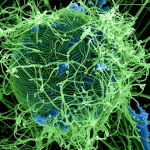Parasites

Had a little touch of the flu last week, but I am pleased to announce that I am back thumping away at my computer keyboard. But my run-in with what turned out to be a relatively benign parasite got me to thinking about how the relationship between a virus microbe and its human host might be considered an apt metaphor for the relationship of humans with this beautiful planet upon which we reside.
Viruses are different than your standard bacterium in many ways: most bacteria are harmless, for example, and, in certain cases, are actually beneficial to their human hosts. Further, fewer than one percent of all bacteria actually cause disease, although the ones that do can be doozies, such as those that are responsible for the bubonic plague, cholera, meningitis and tuberculosis as well as serious and life-threatening staphylococcus infections.
One of the differences between a bacterium and a virus, though, is that a virus cannot exist without a host, and most viruses do, indeed, cause disease in humans. Further, most harmful bacteria can be completely eliminated from the body with the use of antibiotics (so far, anyway) whereas, once one has contracted a virus, he is stuck with it for life (even though the stricken’s immune system will detect and neutralize the pathogen and likely hold it at bay indefinitely).
Viruses reproduce by attaching themselves to cells and then hijacking the cells’ reproductive machinery. And, even though they may cause disease in their host, they do not necessarily kill the host, but more often induce lifelong, chronic suffering to one degree or another (kind of like your 23 year-old nephew living in your basement for the past two years). In fact, host-killing viruses are usually considered maladapted, such as the HIV-1 AIDS virus, since it is not in a virus’ best interests to eliminate its host. But, over time, such viruses mutate and become better adapted and, correspondingly, less lethal (e.g., HIV-2).
Human beings seem to best fit the virus metaphor since, no matter what happens on this planet, barring its total destruction, I suspect there will always be a few of us who, like cockroaches, will manage to huddle in a cave or under a crumbling overpass somewhere, survive and reproduce. Further, humans seem to be of the maladjusted variety, since most have not yet fully accepted the fact that if they do not change their ways they will kill their host. Examples of such behavior would include the continuing destruction, due to logging, of the virgin Amazon River forests, which are estimated to provide up to 20% of the oxygen we need to exist; poor farming practices on a large scale that result in the erosion of topsoil necessary to grow food; and improperly controlled smelting and coal burning, which can emit nitrous oxides into the atmosphere resulting in acid precipitation, which has caused the degradation of forests and lakes in both Europe and North America. Further, the release of photochemical smog, sulfur dioxides and mercury emissions into the atmosphere have been shown by epidemiological studies to increase human death rates. (Please note that I am not referring to global warming here – I’ll save that topic for another time, perhaps).
It is my observation that developing countries (some very large ones, in particular) seem to simply turn a blind eye to this dilemma. So, it would thus appear inevitable that our species will experience one of two potential outcomes in the near future, at least in terms of astronomical timelines: humans will eventually, by their own design or by the brute force of nature, become stabilized with their host planet, where they will be the agent of a dystopian existence of fouled air and water, saline intrusion of fresh water aquifers, species extinctions, sickness, disease and squalor (do some research of your own on the environmental conditions existing within the USSR that were discovered shortly after the falling of the Iron Curtain); or they will figure out how to reduce their debilitating impact on the planet to the point where they can perpetuate an acceptable and stable quality of life. At least for now.
One comment
Cockroach/Human/Bacterium species is in the works somewhere right? JMK